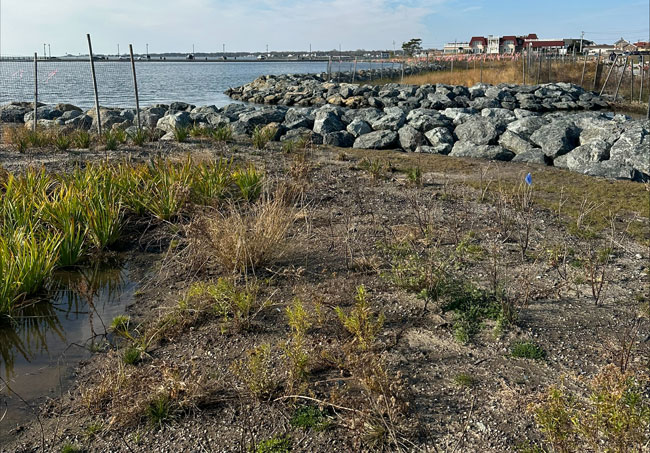
The Patchogue living shoreline is one of the NNBF projects highlighted at a NYS symposium. Credit: Kathleen Fallon/NYSG
Contact:
Kathleen Fallon, NYSG Coastal Processes & Hazards Specialist, E: kmf228@cornell.edu, P: (631) 632-8730
NYSG is identifying and filling knowledge gaps surrounding natural and nature-based features in New York State to inform and advance resilient shoreline practices
Stony Brook, NY, May 27, 2025 - Utilization of natural and nature-based features (NNBF) is a novel approach for shoreline management in New York State (NYS), but gaps remain in both knowledge and practice. Shoreline decision-makers often lack the necessary information on NNBF suitability and performance, particularly in the diverse marine, riverine, and freshwater coastal environments of the state. More work is required to identify critical needs to advance the use of NNBF to develop socially, ecologically, and structurally resilient shoreline practices in New York State (NYS).
New York Sea Grant (NYSG) is addressing the need for NNBF data sharing and outreach through forums, workshops, and communication products that connect diverse end-users with relevant expertise. Throughout 2024, NYSG convened multiple stakeholders from organizations representing state agencies, non-governmental organizations (NGOs), and shoreline contractors to identify NNBF-related knowledge gaps and data needs. Virtual forums provided case studies of baseline conditions, success rates, and socio-cultural benefits of NNBF. In April, more than 100 practitioners convened at four locations connected virtually across the state to highlight NNBF projects.
More than 95 percent of the participants in NYSG NNBF events in 2024 reported that they will use the knowledge gained. More than 80 percent stated that they would change the way they assess their NNBF projects.
NYSG is working with NNBF practitioners to meet the goal of informing and influencing shoreline planning, design, and management in NYS by providing research and case studies from across the U.S. This collaboration is gathering, developing, and sharing information that will advance the utilization of NNBF throughout NYS. Learn more at srijb.org/nature-based-solutions/.
Project Partners/Funders:
• Science and Resilience Institute at Jamaica Bay
• Funding: U.S. Coastal Research Program
More Info: New York Sea Grant
Established in 1966, the National Oceanic and Atmospheric Administration (NOAA)’s National Sea Grant College Program promotes the informed stewardship of coastal resources in 34 joint federal/state university-based programs in every U.S. coastal state (marine and Great Lakes) and Puerto Rico. The Sea Grant model has also inspired similar projects in the Pacific region, Korea and Indonesia.
Since 1971, New York Sea Grant (NYSG) has represented a statewide network of integrated research, education and extension services promoting coastal community economic vitality, environmental sustainability and citizen awareness and understanding about the State’s marine and Great Lakes resources.
NYSG historically leverages on average a 3 to 6-fold return on each invested federal dollar, annually. We benefit from this, as these resources are invested in Sea Grant staff and their work in communities right here in New York.
Through NYSG’s efforts, the combined talents of university scientists and extension specialists help develop and transfer science-based information to many coastal user groups—businesses and industries, federal, state and local government decision-makers and agency managers, educators, the media and the interested public.
New York Sea Grant, one of the largest of the state Sea Grant programs, is a cooperative program of the State University of New York (SUNY) and Cornell University. The program maintains Great Lakes offices at Cornell University, SUNY Buffalo, Rochester Institute of Technology, SUNY Oswego, the Wayne County Cooperative Extension office in Newark, and in Watertown. In the State's marine waters, NYSG has offices at Stony Brook University and with Cornell Cooperative Extension of Nassau County on Long Island, in Queens, at Brooklyn College, with Cornell Cooperative Extension in NYC, in Bronx, with Cornell Cooperative Extension of Ulster County in Kingston, and with Cornell Cooperative Extension of Westchester County in Elmsford.
For updates on Sea Grant activities: www.nyseagrant.org, follow us on social media (Facebook, Twitter/X, Instagram, Bluesky, LinkedIn, and YouTube). NYSG offers a free e-list sign up via www.nyseagrant.org/nycoastlines for its flagship publication, NY Coastlines/Currents, which it publishes 2-3 times a year.